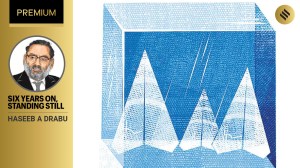Click here to join Express Pune WhatsApp channel and get a curated list of our stories
Love between courtesan and scholar to come alive on Pune stage
Well-known director Sapan Saran directs students of Drama School Mumbai in a contemporary staging of the classical drama Mṛcchakatika
 Mṛcchakatika revolves around the romance of Vasantasena, the beautiful and wealthy nagarbadhu or courtesan of Ujjayini, and an impoverished young scholar Charudatta. (Facebook/ Drama School Mumbai)
Mṛcchakatika revolves around the romance of Vasantasena, the beautiful and wealthy nagarbadhu or courtesan of Ujjayini, and an impoverished young scholar Charudatta. (Facebook/ Drama School Mumbai)Living in the 5th century CE, playwright Sudraka has left little information about himself except that he lived in Ujjayini and created one play, a charming Sanskrit drama, Mṛcchakatika (The Clay Pot).
“It is a text that is ancient, distant and removed from our present reality, yet so close to the bone in its politics and social consciousness. How does a contemporary artist converse with such a text without changing its context? The one big challenge we set for ourselves was that we will not adapt the script to suit our sensibilities,” says well-known director Sapan Saran, who directs students of Drama School Mumbai in a contemporary staging of the classical drama. Titled Mitti Ki Gaadi, the play will be performed at the Shreeram Lagoo Rang Avakash in Pune on August 4, 7 pm.
Mṛcchakatika revolves around the romance of Vasantasena, the beautiful and wealthy nagarbadhu or courtesan of Ujjayini, and an impoverished young scholar Charudatta. The love is complicated not only by their social differences but also palace intrigue and an attempt to overthrow the tyrannical ruler.
“I wanted the students to struggle with the actual text. We adapted the script keeping two things in mind – edit for length, and by making certain political choices that the original text allowed for. Our script underlines the political unrest by bringing it to the forefront right from the first scene. That sets the context of the whole story. The staging is contemporary, in sync with the edited script. I work a lot with music and movement in my work, and this play is such fertile territory for such explorations. Poetry, metaphors, repetition of thematic ideas and dramatic elements like the rath, the rastas – It has been such a joy to be able to reimagine all these using our theatre vocabulary,” says Saran.
As the performance will underline, Mricchakatika has small characters take centre stage as Shudraka humanises our gaze towards the chor, the juaari and the ganika, among others. “To me, the most beautiful aspect of the play is the shift in gaze that Sudraka so deliberately introduces in the piece. This is a huge social commentary on class and caste inequality. It is these characters that unite to cause a mass revolution that eventually overthrows the Brahmin king,” says Saran.
She adds that the play, written with deceiving simplicity and exceptional humor, is as relevant today as it was in any other time. “Yes, there is idealism in it, perhaps even a bit naive. But I am directing 17 young theatre students. There better be hope and idealism,” she adds.
Click here to join Express Pune WhatsApp channel and get a curated list of our stories













